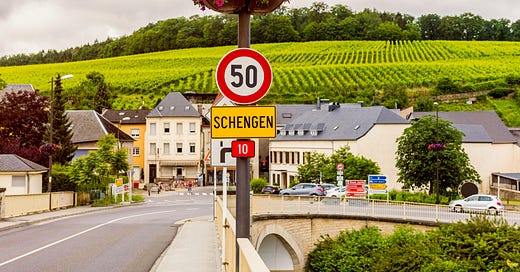Podcast: "Death by a thousand cuts"
Isaac Stanley-Becker on the rise and fall of free movement in Europe
Listen to the podcast via Apple or Spotify
In 1985, Schengen – a predictably trim wine-making village at the tripoint border of Luxembourg, France, and Germany – made European history. Diplomats from the Grand Duchy, France, West Germany, Belgium, and the Netherlands took to a riverboat to sign a simple agreement to remove their mutual border checks.
Forty years on, the now 29-nation Schengen Area covering more than 400 million people is struggling to balance its commitment to free movement with immigration control and sustained political consent. The reinstatement of controls, which was meant to be rare and exceptional, has turned into a “new normal”. Over 21 years, there were just four in which France chose not to impose temporary controls. And, in the greatest single challenge yet to the system, Germany’s centre-left-led coalition – rattled by surging support for the nativist AFD with a federal election looming in 2025 – reinstated controls with its four Schengen founders.
“I think we're witnessing its death by a thousand cuts,” says Isaac Stanley-Becker, author of Europe without Borders – a history of Schengen published today. In an interview for the New Books Network, he told me: “The signs are mounting that these threats – whether it’s the pandemic, a record number of asylum seekers in 2015 and the aftershocks of war in the Middle East, war in Ukraine – are testing [the free-movement] vision in an unprecedented way”.
Now an investigative reporter at the Washington Post, Stanley-Becker carried out his doctoral studies on the history of European free movement at Oxford in the wake of the 2015 migration wave and the 2016 Brexit referendum. “I realised there hadn't been a history of this consequential agreement written, in large part, because there had been a 30-year embargo on the diplomatic records,” he says. “A lot of these materials had never been looked at and that, for a journalist, is gold. It's like a historical scoop”.
Focused on the 1985-95 birth of Schengen, the book covers the intellectual foundations of free movement, the lucky coincidences that propelled it, and the intense debate over the division of powers, culture, and colonial reparations that still drive French political debate decades later. “It’s fascinating the way this happens in a very humdrum, diplomatic way and then it becomes explosive within a number of years,” he says. “Schengen is a story of unintended consequences or consequences not fully grasped by its makers at the time”.
For my Writers’ Writers list, he chose East West Street: On The Origins of Genocide and Crimes Against Humanity by Philippe Sands (Weidenfeld & Nicolson, 2016) and The Man Who Saw Everything by Deborah Levy (Hamish Hamilton, 2019).





